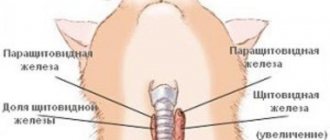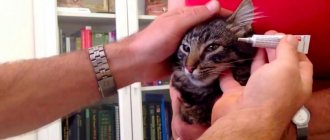Hormonal drugs
There are many special drugs designed to suppress sexual desire in cats.
They are available in the form of drops, tablets or injections. Hormonal drugs, including “Sex Barrier”, “Contrasex”, “Nonoestron”, “Stop-Intim” and others, are often used by owners of uncastrated cats, allowing them to temporarily reduce the troubles that their behavior causes.
A significant disadvantage of hormonal drugs is the enormous harm they cause to the health of the animal. Frequent use can lead to consequences such as diabetes, cancer and other diseases.
In case of emergency, veterinarians recommend using natural-based sedatives, such as “Cat Bayun” and “Stop-stress”. They are not as effective as hormonal ones, but they do not harm the health of the animal.
Remember all
Mating cats
If the cat is an adult (over a year old) and has already had matings, then there is a possibility that he will never forget about this experience, and the corresponding aspects of behavior will be preserved.
However, it is impossible to predict such a development of events; not all cats are so temperamental, and most of them, after removal of the testes, forever lose interest in amorous affairs. And, if castration was carried out according to all the rules, then claims can only be addressed to nature itself.
The specialist was obliged to warn about this, but, unfortunately, a warning cannot serve as a guarantee of “insurance” against such a development of events. The owners will most likely have to come to terms with this feature of the cat’s behavior and solve the problem every time it appears.
Chemical castration of a cat
If the owners chose chemical castration or vasectomy instead of a banal surgical solution to the problem, well, the risk is a noble cause, but they won’t have to drink champagne this time, since all other castration options, except the classic one, give half-hearted and unstable results.
In this case, they will only have to blame for their short-sightedness and misplaced pity. The solution may be to carry out full castration, but there may not be a 100% result.
Attenuation of sexual functions in a castrated cat
It is important to know that the attenuation of sexual functions in each cat occurs gradually and individually. This process can last for several months or even years, or it can end once and for all when the animal recovers from anesthesia.
A castrated cat climbs on a cat - consequences
He can't stop wanting a cat, but he can't become a father. However, there are isolated cases where a castrated cat managed to breed a cat in the first month after surgery, and kittens were born.
Perverted cats
An interesting fact: if there are two cats in the house, and both are neutered, then a “he-she” relationship is possible between them in cases where castration has no effect. Of course, there is nothing dangerous in such games, and there is no point in strictly suppressing them.
An adult cat attacks a kitten. What to do?
Help me please. I have a rather difficult situation with my pets. A Persian cat, Marisha (13 years old), and an Alabai cat, also a girl (10 years old), have been living together in a country house for many years.
My cat is not neutered and has never been castrated, she has a very complex character, she doesn’t listen when you call her, she won’t give in to your arms, but at the same time she is affectionate and loves to sleep next to me. Cats came running to her site, but she did not let them near her. He behaves very aggressively towards other people's cats.
And some time ago a young cat came running to us (we assume he is not even a year old yet) and we decided to keep him. The cat is very affectionate and tame. Now the following is happening: Marisha attacks the new cat and does not let him into the house or even onto her half of the property.
I personally punished her for attacking him, but this punishment did not lead to anything, she continues to provoke fights. The dog doesn't pay any attention to them. Tell me, please, what should I do? How can you show Marisha that this cat is yours? After all, winter is coming and I’m going to move the new cat into the house (now he lives in the gazebo).
Sincerely, Veronika Kutsenko
Good afternoon I want to say right away that you are faced with a difficult task. Your adult cat is used to living in the house alone and feeling like a full-fledged mistress in it, but you want to convince her that the new pet also has the right to freely walk around her territory.
However, if you are firm in your desire to make friends with your pets, please have a lot of patience, the process will be long. Your task will be to accustom the animals to each other gradually, in small steps. If possible, first place them in adjacent rooms and separate them with some kind of translucent partition or mesh - so that the animals can see each other, smell the neighbor, but at the same time they cannot fight.
They need time to adapt. They must have separate bowls and litter trays. You can periodically change their places. Marisha must understand and realize that the new cat now also lives in this house as a member of the family, and the newcomer must get used to it.
At the same time, under no circumstances show greater affection for any of the animals; show equal care and attention towards them. The day will come when, under supervision, you will be able to remove the partition between the cats, and after some time, when you are sure that they are not trying to sort things out, you can gradually leave them alone.
But under no circumstances should you show aggression towards your adult cat, since by doing this you achieve the exact opposite of what you want: Marisha associates the new tenant with receiving punishment and her own discomfort, and this makes her even more angry with the cat.
You can ask your questions to Dmitry Kuklachev about the health, training and education of animals at
In the apartment
An uncastrated cat living in an apartment causes a lot of inconvenience to its owner. If you are not going to castrate your pet, then be prepared to face problems such as:
- Tags. Most unneutered cats mark their territory in this way. This is the natural behavior of a sexually mature animal; it is useless to scold for it. Animals periodically mark the owner’s things, furniture and corners. The tags have a strong odor that is difficult to get rid of.
- Night screams. With a loud cry, the cat scares away rivals from the house and at the same time notifies the females of its presence.
- Aggression. With the onset of puberty, a previously affectionate, playful kitten can become an aggressive male. This is due to the action of testosterone, which encourages the cat to strive for leadership and conquer territory.
Features of the castration procedure
Castration of cats is carried out for various reasons. This could be a very restless behavior of the animal, or excessive efforts to mark the territory, or even medical indications. Castration is the only way to rid a cat of the reproductive instinct.
The operation involves removing the male's testes after puberty. Before 9-12 months, the corresponding instinct does not manifest itself, so there is no point in castration, and besides, the procedure can harm the health of a young cat.
After the operation, males experience sexual desire, but this takes some time. As a rule, the animal does not strive to mate after 7-20 days, but the period depends on the characteristics of the organism.
The behavior of a castrated cat changes slightly:
- the animal becomes more balanced and calm;
- Marks territory less or stops doing so altogether;
- does not try to run outside at every opportunity;
- does not meow at night, demanding a cat.
A neutered cat wants a cat: reasons
If a cat was castrated at a young age before he had sexual experience, he does not walk on the street and there are no females in the apartment, then in most males the sexual desire disappears after sterilization. But when surgery occurs after the male cat has been bred, the habits can last a lifetime.
For some time, testosterone produced by the testes circulates in the blood, and if a month after the operation the cat smells a leaking female, he becomes excited. Even in most adult males, the desire to cover cats disappears after several months and sometimes years.
If the cat walks alone
Owners of unneutered cats who let them outside feel like they are doing a good deed by letting their pet run around and socialize with other cats.
Such people forget about the many dangers that await a cat on the street:
cars that can seriously injure or kill an unwary cat; flayers and simply cruel people who can kick a pet; scattered poisoned dog food that a cat might try; various infections, including those dangerous to people; hungry packs of dogs; fights with other cats, in which the animal may lose an ear or an eye.
In addition, most owners do not want to think about the fact that free-ranging pets reproduce uncontrollably.
Cat owners do not feel involved in the increase in stray animals, because all problems with kittens lie with cat owners, who either get rid of the kittens right away, or let them grow up and throw them away. This exacerbates the problem of homeless animals, and all animal owners who allow animals to roam are guilty of it.
What to do if after castration the cat continues to mark?
It is not recommended to use physical force. This often only makes the situation worse. If there is a need to punish a pet, you need to declare yourself as the main “male” in the apartment.
To do this you need to proceed as follows:
How does castration of cats occur?
Sterilization of cats
After castration, the cat marks its territory, what to do?
- Immediately after detecting feces, grab the animal by the scruff of the neck, then lift it to face level.
- Looking him straight in the eyes, you need to hiss, that is, reproduce the sounds that fighting animals make. It may not work right away, you'll have to practice.
- When hissing, you need to hit your pet’s nose with your index finger several times on the left and right (not too hard).
- During the procedure, the cat will hiss, squirm, and close its eyes. When he meows pitifully, release him.
- After the procedure, you need to re-mark the entire area. To do this, you need, firstly, to clean the corners and get rid of the smell, and secondly, wipe the surface with something odorous (socks, T-shirts, perfume will do).
If it is not a matter of habit, you will have to resort to the following actions:
- In case of cryptorchidism, you need to take your pet for re-castration. This time, abdominal surgery will be required, which is much more complex. Therefore, it is undesirable to use an old clinic (even if they offer to do everything for free), since if the doctor there did not notice that the cat is cryptorchid, then this indicates too low qualifications.
- You can reduce the concentration of hormones by reducing the amount of protein foods. Of course, you need to keep your pet on a diet for no more than a month, so as not to cause a deficiency of amino acids and vitamins in him.
- If your cat is marking his territory due to competition, stress or lack of attention, give him valerian or other sedatives. In addition, you need to give your pet more energy, play with it, and pet it.
- In case of urolithiasis or cystitis, the underlying disease is treated. Anti-inflammatory drugs, painkillers, and antibiotics are commonly used. An important element of treatment is the diet, which is prescribed based on the causes of the disease.
What to do if a cat wants a cat after castration
The situation arises when several animals of the opposite sex live in the same room. If the owner does not like that the castrato is trying to cage and there are several rooms allocated for the needs of cats, the animals are seated. If a male who has recently been castrated shows interest, hormonal contraception is used. A veterinarian will help you choose the right remedy. If the layout of the apartment allows, animals of different sexes are seated during estrus.
Despite the fact that the pet’s behavior does not suit the owner, the pet cannot be punished. Otherwise, a stressful situation will arise in which the animal becomes aggressive.
To distract the animal from acquired habits, it is occupied in the following ways:
- Expansion of vertical territory. The cat wants to have safe places for rest and entertainment. Beds are placed on the window, shelves are attached to the walls, as well as hammocks. The cat climbs on a hill and feels comfortable.
- Using a scratching post will protect upholstered furniture, allow the cat to relax and relieve stress.
- Interactive toys increase physical activity and distract from other activities.
- If there are several cats in the apartment, you need to place a feeder and tray for each in different places.
In some situations, the owners themselves provoke the cat into inappropriate behavior. Stroking and squeezing the animal affects the erogenous zones, and the pet becomes excited. At such moments you should stop communicating.
Can a neutered cat mark territory?
The correct answer is no. However, here you need to find out 2 things: whether the cat is really neutered and whether he is really marking his territory. It is quite possible that the pet simply has a habit of relieving itself in the wrong place.
Signs that a cat is marking territory:
- his urine has a strong unpleasant odor (the main symptom);
- the animal pees mainly on vertical surfaces;
- the pet behaves restlessly, constantly asks to go outside, screams, “demands a cat”;
- the cat's appetite decreases, and he becomes restless, aggressive, scratches furniture (more often, more strongly than usual).
If such signs are observed, then the operation was unsuccessful. It is quite possible that the cat turned out to be cryptorchid, that is, one testicle was not removed, since it was in the abdominal cavity. The surgery will have to be repeated.
Normal urination and marking are two different things. By marking territory, the cat tells the animals that he is the owner of this territory. In addition, the marks attract females. At the time of sexual heat, the pet's urine changes composition due to hormones, its smell becomes extremely unpleasant and strong. Cats also love to leave marks on their owner’s things. Shoes suffer most often, because they have the smell of someone else’s territory, and the pet wants to make them “his own.”
When marking territory, the cat pees exclusively on vertical surfaces. He does this so that the smell spreads further. Also, his instincts tell him that urine is quickly absorbed on the soil, so he needs to defecate on vertical objects. If your pet pees on horizontal surfaces and the smell is weaker than before, then most likely the reason is not the animal’s sexual instinct.
Why does a neutered cat show interest in the cat?
The cat is clearly planning to do something with the kitty
There are many cases where cats that had been castrated for a long time again became gallant gentlemen when a fluffy person of the opposite sex appeared, or in the spring they behaved extremely depravedly with soft toys and the owner’s slippers.
The owners' reaction usually ranges from amazement to indignation at a poorly performed operation with claims against veterinarians.
However, whether such claims are justified is an ambiguous question.
Veterinarian's mistake
There may have been pilot error
If the veterinarian kept silent about the fact that the cat, whom he supposedly castrated safely, is a cryptorchid and that the second testicle remained in the abdominal cavity, this is a veterinarian’s mistake.
It is impossible for a specialist not to notice this fact, and, most likely, he will have to perform abdominal surgery, at the expense of the institution (veterinary clinic).
Why does a neutered cat mark its territory?
A cat may continue to mark its territory after surgery in the following cases:
Cryptorchidism is a pathology in which one or both testes do not descend into the scrotum, but remain in the pelvic area. Since the temperature in the abdominal cavity is higher, the level of hormones in cryptorchids is much higher. Why do such animals behave aggressively? During surgery, a normal doctor should notice this feature and perform abdominal surgery. But if the veterinarian removed only one testicle, the hormones will continue to be produced, but the cat's behavior will remain the same.
Little time passed after the operation, which is why the amount of hormones did not have time to decrease. In addition, the animal can maintain the habit for some period even with a decrease in the number of hormones in the blood.
We operated on an adult pet who had already entered into relationships with cats. If, as a result of the activity of hormones, he has formed a strong habit of marking the boundaries of his personal territory, then it may not disappear for a long time after castration. If the behavior persists for more than six months, the pet should be shown to a veterinarian or animal psychologist.
Competition for territory with other animals. This is especially true if there is another cat in the apartment. In this case, the habit of marking territory will be stimulated by an external stimulus. As a result, the pet may not get rid of the dishonest reflex for quite a long time.
Stress. When moving or replacing furniture, your cat may want to make the new environment smell more familiar. Of course, why would he urinate in all corners?
In addition, this is a great way to attract the attention of the owner, albeit with a negative sign. Thus, bowel movements in the wrong places during stress are just a measure of psychological protection.
Change of owner
In this case, the uncertainty of a new relationship is added to the stress. The animal does not understand whether it is necessary to follow the old rules in the current conditions. In particular, will the owner demand that the cat go exclusively to the potty. Of course, the assumption is tested in practice.
The appearance of a new pet. In this case, competition for the owner's attention arises. The cat may behave aggressively towards its neighbor, become capricious, or get sick. An option to attract attention would be to defecate in different places. In addition, the tags warn the competitor that he is redundant.
Indifferent attitude of the owner towards the pet. It may seem that cats are too individual and independent to need the attention and affection of their owner. But in reality, they strive for love, just like everyone else. If they don’t get enough of it, they may start doing things in inappropriate places to attract attention.
Urolithiasis disease. At the same time, stones form in the bladder. Because of which the animal has problems with urination. The pet behaves restlessly, refuses to eat, and constantly tries to pee, but it fails. As a result, due to endless unsuccessful attempts to relieve itself, the animal may begin to defecate in any place.
Cystitis. As a result of inflammation, the irritability of the bladder walls increases. As a result, the animal is forced to frequently run to the toilet, and this often leads to the fact that the pet begins to defecate before reaching the litter box.
RESPONSE OF THE SITE “MURKOTIKI”
It is quite natural for uncastrated cats to mount hands, things, and other animals, in particular cats. This is how sexual hunting manifests itself. However, this behavior does not always go away after castration. Let's find out why.
The first and worst option is that the cat is cryptorchid (one or two testicles did not come out into the scrotum), and the veterinarian did not say anything about this and did not cut everything out clean. Such situations seem fantastic, but in fact they happen all the time. The problem is that finding the testis in the abdominal cavity, where it is located in a cryptorchid, is not so easy. Unscrupulous veterinarians do not admit their mistakes and give the cat back to the owners as a castrato. But in fact he is not castrated.
Article continues after advertisement
The second reason is that hormonal levels do not drop immediately, but within several months after castration. Therefore, during the first months, sexual behavior may persist and the cat may even leave marks. However, this goes away over time.
If a lot of time has passed and the cat is still mounting cats, this is also no reason to worry. Many castrated cats, like, by the way, men (remember eunuchs), retain the ability to perform sexual intercourse, that is, they still remain men and their penis is able to be in an erect state. But such a cat cannot fertilize a female.
By the way, this property of castrated cats is used by some nurseries that have castrated and fertile cats. The fact is that a cat can become pregnant no more than 2 times a year, and preferably 1 time a year. But they leak more often - 3-4 times a year. It is harmful to relieve estrus with hormonal pills and injections, but a neutered cat that has retained the ability to have sexual intercourse can satisfy the cat without consequences. Then her estrus stops - and the cat returns to normal life until the next estrus.
In a bear shelter, a long-castrated male mounts a female - “out of habit”
Most often, castrates are attracted to cats during the period of estrus: the smell can provoke sexual behavior. But it happens that a cat sits on a cat outside the heat period or even on another cat. There may also be nothing wrong with this, because... many cats, especially those castrated at a later age, that is, after the manifestation of sexual behavior, can retain it even after castration. Let's just say, out of habit. The cat can even make characteristic movements, but this means absolutely nothing.
However, sometimes cages indicate increased levels of stress and other emotional disturbances. Sometimes a cat attracts attention to itself because... I once noticed that the owner reacts to such behavior, and now the cat achieves communication in this way. In this case, a consultation with an animal psychologist is indicated to find out the specific reason.
Why does a cat continue to be attracted to cats after castration?
The question of whether a neutered cat can want a cat is often addressed to veterinarians if the pet tries to ride the cat or imitates sexual intercourse with a soft toy, a fluffy hat, or a velor blanket.
The cat has already had contact with cats
If the pet had sexual contact before sterilization, he tries to repeat it after. The pheromones released by a cat during the estrus stage are detected by the male at a distance and become excited. Whether a cat can become pregnant from a neutered male depends on the length of time after the procedure. Fresh sperm no longer enter the reproductive tract, but the remaining ones are capable of fertilization for another 7-9 days.
After this period, the cat will receive a release and calm down, but there will be no conception. In some cases, a false pregnancy is possible: cessation of estrus, swelling of the nipples, change in behavior. However, after 20-30 days everything goes away.
The operation was performed by an unscrupulous doctor
Another reason why a cat asks for a cat after castration is a medical error.
About 2% of cats suffer from cryptorchidism, when the testicles are not lowered into the scrotum, but are located in the groin area or in the abdominal cavity. With ectopia, the testis may be located in the thigh, perineum, or at the root of the penis. Unilateral pathology is more common.
If there was no thorough examination of the animal before the procedure, one testicle is removed, and the second remains and continues to produce hormones that determine the behavior of males.
Repeated surgery is necessary because over time, the tissues of the dystopic organ degenerate with the formation of seminoma (malignant tumor). Veterinarians advise owners to feel the pet's scrotum themselves before sterilization. There should be 2 testicles there, shaped like beans.
Little time has passed since castration
The behavior of males changes some time after sterilization. The desire for sex persists for another 15 to 60 days, depending on the temperament and sexual constitution of the animal. Some castrates show interest in females even years after the procedure, because... sex hormones are secreted not only by the testes, but also by the pituitary gland and adrenal glands. Sometimes their number is excessive.
Why are pets neutered?
True pet lovers wonder why they should castrate or neuter their furry household members and violate their natural instincts. However, the other half of loving owners believe that it is much more humane to use surgical intervention than to keep their furry friend locked up and tolerate his negative behavior.
In this case, the animal does not cause mischief in the apartment and does not cause discomfort, since, if necessary, it can mate and cope with sexual needs. If we are talking about pets, you should not refuse the castration procedure.
Castration and attraction to the opposite sex
Thanks to the procedure of removing the gonads, animals cease to be interested in the opposite sex. However, after the operation, many owners complain that practically nothing has changed in the pet’s behavior.
He remains partial to females, although not as pronounced as before.
Why does this happen? This is due to the fact that pets have previously been sexually active, whether once or repeatedly. In this case, the pets constantly released sex hormones
This is why the pet remembers instincts from life before surgery, as a result of which the cat wants a cat after castration.
How to determine that a male wants an individual of the opposite sex
Determining what your cat still wants after castration is not that difficult. This can be understood by the following signs:
- The pet constantly lives near the front door or by the window. At any opportunity, the animal tries to escape from the house.
- The furry friend continues to mark his territory. He mainly marks the edges of sofas, the owners' shoes, doors and even walls. The smell is different from cat urine, it is more pronounced and difficult to get rid of.
- Constantly calling the opposite sex with a loud meow. Animals are especially active in the evening.
- The animal becomes aggressive and angry. Trying to pet a cat often results in scratched hands.
When to perform the operation
To ensure that after surgery the animal ceases to have interest in females, cats should be castrated before the age of one year. The best option is 7 - 8 months, during which time the pet’s body has time to finally form and get stronger. In addition, at this age pets do not have a sexual instinct. It is strictly not recommended to castrate a cat too early, since the animal has not reached puberty. In this case, the surgical procedure may be pointless.
How is the operation performed?
For your furry friend, the operation is completely painless. During the operation, the pet is under anesthesia.
Meanwhile, the veterinarian removes hair from around the genitals, carefully cuts the scrotum and removes the testes. The procedure lasts no more than half an hour. After the procedure is completed, the animal comes to its senses; recovery usually takes a day. During this period of time, the pet needs to be provided with physical rest and a comfortable sleeping place should be prepared.
https://youtube.com/watch?v=_yQiNNpKIXc
Possible reasons for refusing mating
Even when a male ardently demands to mate with the opposite sex, difficulties often arise in which the male categorically refuses to meet the female.
The reasons why a cat does not want a cat can be completely different. Let's consider the main ones :
- The animal feels uncomfortable in unfamiliar conditions. In this situation, there is only one way out - to breed the animals in the male’s territory.
- A cat often does not want to mate due to low levels of the sex hormone. But for a pet to completely lose interest in the opposite sex, the testosterone level must be incredibly low, otherwise it is necessary to look for another reason for the reluctance to mate.
- Perhaps the cat does not breed a cat because it is too young. This is due to the fact that animals reach puberty after the age of one year.
- A previously neutered pet loses interest in the opposite sex.
- The color of the opposite sex can play an important role. For example, a pet may be indifferent to the opposite sex with a bright black color, but at the same time, without problems, breeds a cat of a lighter color.
- Your furry friend simply doesn't like the female. If a cat shows aggression when meeting, the male often becomes disgusted. For this reason, the animal categorically refuses to mate.
Recommendations for owners
If a cat asks for a cat after castration and continues to actively mark its territory, the owner should consult a veterinarian. Most likely, the doctor will recommend sedatives and possibly hormonal medications. This will help calm the pet and correct its behavior. You cannot select medications on your own.
You can try to distract a cat that is interested in the neighbor cats with a favorite treat, an interesting activity or a toy. A neutered cat who continues to trample cats should be given the opportunity to sharpen his claws. This is an important point that helps the animal mark its territory, maintain its high status and simply relieve stress.
In general, an undesirable style of behavior can manifest itself not only in setting on things, but sometimes on other cats. Animals often rub too hard against their owner’s hands or objects. It is better to stop such manifestations at the very beginning, but not by punishment, but by providing an alternative to get rid of accumulated energy. Interactive toys, such as a soft mouse or a ball, will help here.
When petting a cat, you should avoid overstimulating it. It is worth choosing those areas on the body that promote relaxation, stopping caresses when signs of arousal appear.











